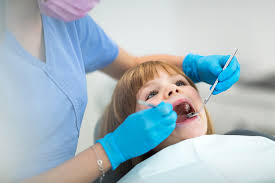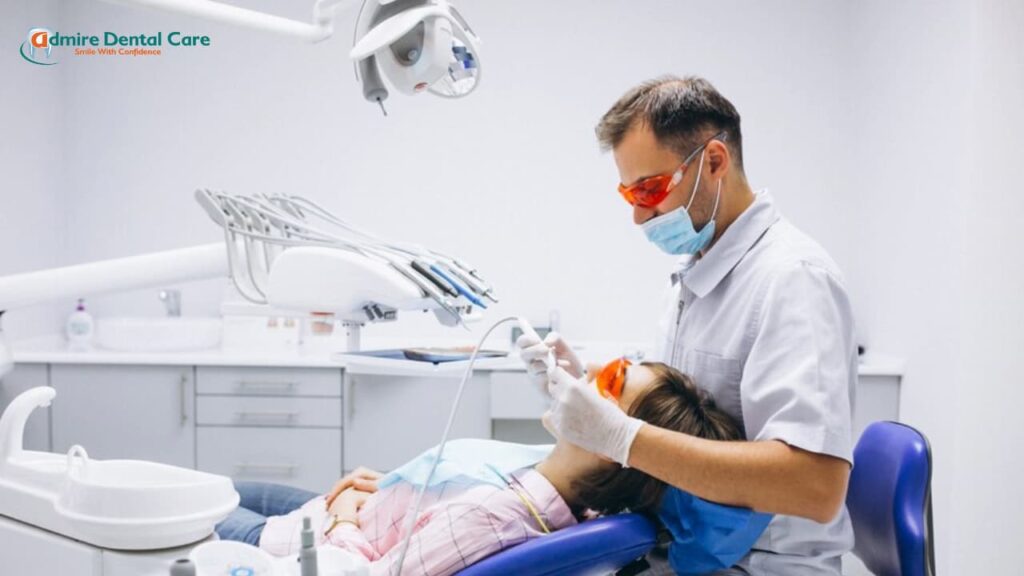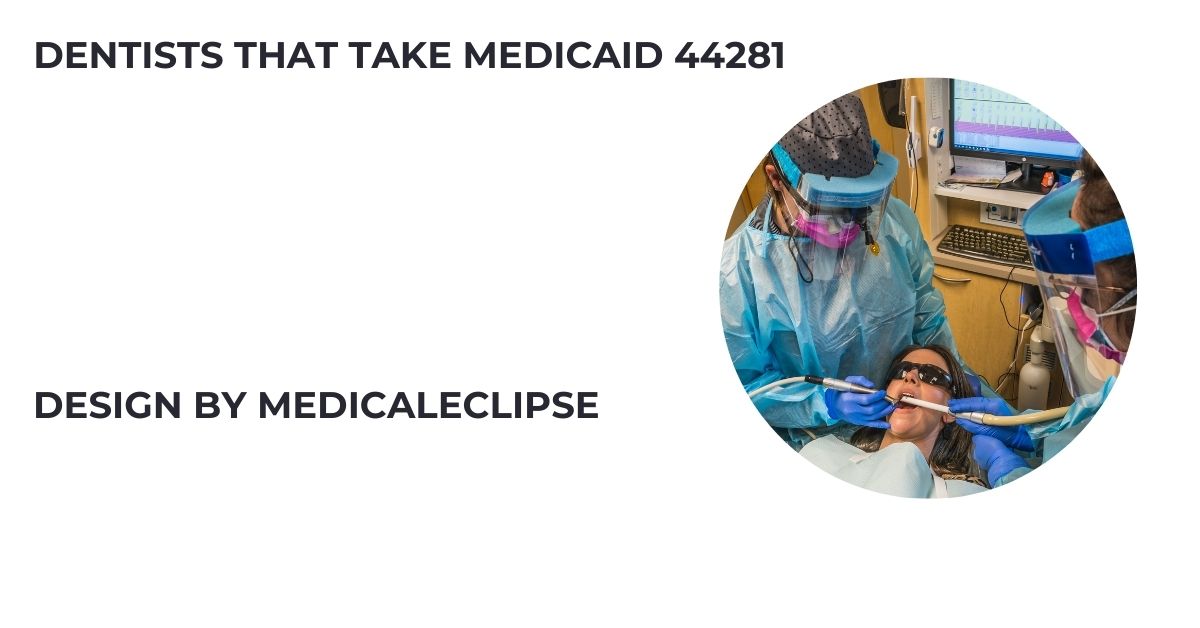Medicaid in Ohio provides dental coverage for low-income individuals, including preventive, restorative, and emergency services. This guide helps you find Medicaid-accepting dentists in the 44281 area.
In this article, we’ll guide you through everything you need to know—what’s covered, how to find the right dentist, and what to expect during your visit. Let’s make finding affordable dental care simple and stress-free!
What Is Medicaid and How Does It Work for Dental Coverage?

Medicaid is a state and federally funded program that provides medical and dental coverage to low-income individuals, including families, children, elderly adults, pregnant women, and people with disabilities. The program helps ensure that people who might otherwise struggle to afford medical and dental care can still receive necessary services.
In Ohio, Medicaid provides dental coverage through the Ohio Medicaid Dental Program. Medicaid dental coverage is comprehensive and can help cover preventive care, diagnostic services, and more advanced treatments. However, Medicaid’s dental benefits can differ between states, so it’s important to understand the specifics of what’s covered in Ohio.
What Dental Services Are Covered Under Ohio Medicaid?
Ohio Medicaid covers a variety of essential dental services, including:
Preventive Services:
- Routine Checkups: Regular dental exams are essential for preventing dental issues before they become serious. Medicaid covers routine checkups, which typically include an oral examination to assess the condition of your teeth, gums, and mouth.
- Cleanings: Dental cleanings are covered to remove plaque and tartar buildup, helping to prevent cavities, gum disease, and other oral health issues.
- X-Rays: Medicaid will typically cover diagnostic X-rays, which help dentists detect underlying issues that may not be visible during a regular exam.
Basic Dental Services:
- Fillings: Medicaid covers fillings for cavities to restore the integrity of your teeth and prevent further decay.
- Extractions: If a tooth is damaged beyond repair or causing severe pain, Medicaid covers tooth extractions, including wisdom teeth.
Restorative and Cosmetic Services:
- Crowns and Bridges: These services are used to restore damaged teeth or replace missing teeth. Medicaid often covers the placement of crowns and bridges when medically necessary.
- Dentures and Partials: Medicaid can help cover the cost of dentures or partial dentures if you are missing teeth. These prosthetics allow you to chew and speak comfortably again.
Also Read: The Latest Advances in Bladder Cancer Treatment!
Emergency Dental Services:
- Pain Relief and Treatment: If you’re experiencing significant dental pain due to infection, injury, or other issues, Medicaid covers emergency dental services, which may include temporary fillings, pain management, or treatment for infections.
Orthodontic Services (Limited):
In some cases, Medicaid may cover orthodontic services, such as braces, but only if they are deemed medically necessary. This is more common for children with severe dental issues that may affect their overall health or development.
How to Find Dentists That Accept Medicaid in 44281?

Finding a dentist who accepts Medicaid in the 44281 area may seem challenging, but there are several reliable resources available to help guide you through the process. Here’s a step-by-step approach to make your search easier:
Ohio Medicaid Provider Directory
The Ohio Medicaid website has a user-friendly provider directory that allows you to search for dentists in your area by entering your ZIP code (44281) and the type of service you require. This directory will provide a list of dentists who are part of the Ohio Medicaid network. You can filter your results by specialty, location, and other preferences to find the best options near you.
Contact Medicaid Customer Service
If you need assistance or additional information, contacting Medicaid’s customer service is a great way to get support. The customer service team can help you find a Medicaid dentist in your area, check if they are accepting new patients, and confirm the services they offer. They can also answer any questions about your coverage and what services are available to you.
Referrals from Local Clinics and Community Health Centers
Local health centers, including community clinics, are excellent resources for finding dentists who accept Medicaid. Many clinics work closely with Medicaid programs and can provide you with a list of nearby providers. Additionally, local public health offices may have information on Medicaid dental providers in the area.
Also Read: Csi Episource Medical Coding – Reducing Denied Claims!
Search Online Platforms
Online directories such as ZocDoc, Healthgrades, and Dentist.com make it easy to filter dental providers by the insurance they accept, including Medicaid. These sites provide valuable information such as patient reviews, office hours, and services offered, which can help you make an informed decision. Be sure to double-check with the office directly to confirm that they still accept Medicaid, as provider participation can change over time.
Ask Family, Friends, and Social Media Groups
One of the best ways to find a trusted Medicaid dentist is by asking people you know for recommendations. Reach out to friends, family members, or colleagues who live in the 44281 area to see if they can recommend a dentist. You can also use social media platforms, such as Facebook community groups, to ask for recommendations from locals who may have had positive experiences with Medicaid-accepting dentists.
Call the Dentist’s Office Directly
Once you’ve found a potential dentist in your area, it’s important to call the office to verify they accept Medicaid and inquire about specific services. Ask if they are accepting new patients, what types of services are covered, and whether any co-pays or out-of-pocket costs are associated with your treatment. This step ensures that you won’t face any surprises when you visit the dentist.
Benefits of Choosing a Medicaid Dentist in 44281:
Choosing a Medicaid dentist in the 44281 area comes with several benefits:
Affordable Care:

One of the biggest advantages of Medicaid is that it helps reduce the cost of dental care for low-income individuals and families. Medicaid covers a significant portion of dental expenses, so you won’t have to worry about the high cost of procedures such as cleanings, fillings, and extractions.
Access to Comprehensive Services:
With Medicaid, you gain access to a wide range of dental services, from preventive care to more complex treatments like root canals and dentures. The coverage ensures that you can receive the care you need to keep your mouth healthy, regardless of your financial situation.
Quality Care from Experienced Providers:
Many Medicaid dentists have years of experience treating patients with a wide variety of dental needs. They are committed to providing high-quality care, helping you maintain or restore your oral health. You can expect professional, compassionate care from dentists who understand the unique needs of Medicaid patients.
Convenience and Peace of Mind:
By finding a dentist who accepts Medicaid, you don’t have to stress about out-of-pocket expenses or worrying whether your insurance will cover your care. The process is made easier by the fact that Medicaid handles billing directly with the provider, eliminating the need for you to manage complex insurance claims.
Also Read: What Does Wnl Mean In Medical Terms – WNL Explained Simply!
What to Expect at Your First Medicaid Dental Appointment?
During your first visit to a Medicaid dentist in the 44281 area, here’s what you can expect:
- Insurance and Financial Verification:
Be sure to bring your Medicaid card with you, as the dental office will need to verify your coverage before proceeding with treatment. The office may ask for additional information, such as your personal details and medical history.
- Initial Examination:
The dentist will perform a thorough examination of your teeth, gums, and mouth to identify any issues. Depending on your needs, they may recommend X-rays to get a better understanding of your dental health.
- Treatment Plan and Discussion:
After the examination, the dentist will discuss any issues they’ve found and recommend an appropriate treatment plan. This may involve scheduling additional visits for more intensive procedures or recommending preventive treatments to maintain your dental health.
- Costs and Payment:
Medicaid generally covers most costs associated with dental services, but it’s still a good idea to confirm any co-pays or out-of-pocket expenses. The office staff will explain how Medicaid billing works and what to expect financially.
FAQ’s
1. What is Medicaid, and how does it work for dental care?
Medicaid is a state and federally funded program that provides health coverage to eligible low-income individuals and families. In Ohio, Medicaid also covers a variety of dental services, including preventive care, fillings, extractions, and more. Coverage can vary by state, but it generally includes essential dental treatments.
2. Which dental services are covered by Medicaid in Ohio?
Ohio Medicaid covers services such as routine checkups, cleanings, fillings, extractions, root canals, crowns, bridges, dentures, and emergency dental services. In some cases, orthodontic services may also be covered if deemed medically necessary.
3. How do I find a dentist that accepts Medicaid in the 44281 area?
You can find dentists who accept Medicaid by using the Ohio Medicaid provider directory, contacting Medicaid customer service, asking for referrals from local clinics, or using online resources like ZocDoc and Healthgrades. You can also ask friends, family, or community groups for recommendations.
4. Is there a cost for dental services with Medicaid?
Medicaid covers most dental services, but there may be some small co-pays or out-of-pocket costs for certain procedures. It’s important to check with the dental office about potential costs before your appointment.
5. Can Medicaid cover orthodontic services?
In Ohio, Medicaid may cover orthodontic services (such as braces), but only if they are deemed medically necessary. This is typically for children with severe dental issues that affect their overall health or development.
6. How do I confirm that a dentist accepts Medicaid before making an appointment?
To confirm if a dentist accepts Medicaid, call the dental office directly. You can also check the Ohio Medicaid provider directory or ask Medicaid customer service for assistance.
7. Do I need to bring anything to my first dental appointment with Medicaid?
Yes, you should bring your Medicaid card, personal identification, and any relevant medical history. The office staff will use this information to verify your coverage and gather necessary details before your appointment.
8. Are dental cleanings covered by Medicaid in Ohio?
Yes, routine dental cleanings are covered by Medicaid in Ohio as part of preventive care. Regular cleanings help prevent gum disease, cavities, and other oral health issues.
9. What happens if I need emergency dental care under Medicaid?
Medicaid covers emergency dental services, which may include pain relief, treatment for infections, or temporary fillings. If you have a dental emergency, call a Medicaid dentist in your area to discuss available options.
10. How can I get help if I don’t know where to find a Medicaid dentist in my area?
You can contact Medicaid customer service for assistance in locating a Medicaid dentist near you. Additionally, local health clinics, online dental directories, and community referrals can help you find a suitable provider.
Conclusion
Finding a dentist who accepts Medicaid in the 44281 area is easier than it may initially seem. With the help of the Ohio Medicaid provider directory, online search platforms, and word-of-mouth recommendations, you can find a trusted dentist who offers high-quality, affordable care. Medicaid makes dental services accessible for those who need it most, providing coverage for essential preventive and restorative treatments.

Leave a Reply